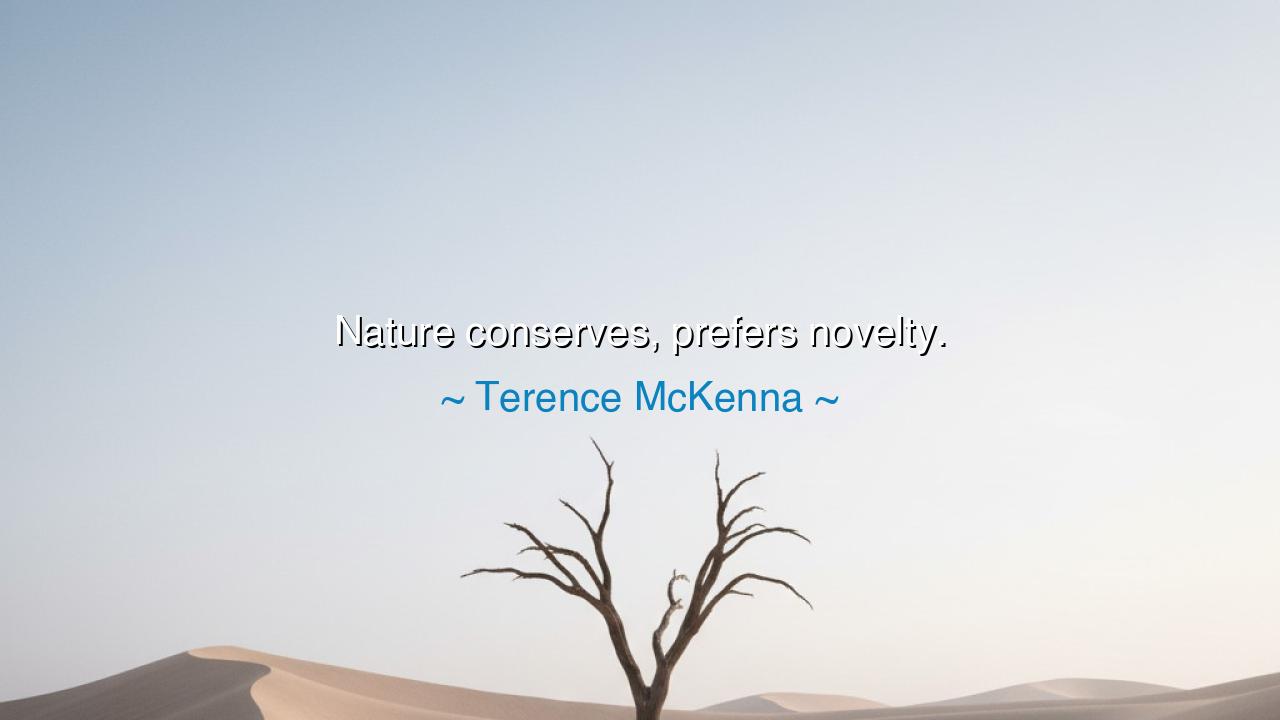
Nature conserves, prefers novelty.






The words of Terence McKenna—“Nature conserves, prefers novelty”—resonate with the timeless pulse of life itself. Here, nature is not static nor bound by repetition alone; it is a living, breathing force that safeguards what works while continually seeking the new. To conserve is to honor continuity, the thread of existence that preserves balance and sustains life. To prefer novelty is to embrace change, to explore the unforeseen, and to birth forms and patterns that have never existed before. In this duality lies the eternal rhythm of creation: stability and transformation intertwined.
The meaning of this reflection is that life itself thrives in the interplay between preservation and innovation. Nature retains what endures—the lessons of adaptation, the structures of survival, the patterns that have proven resilient. Yet, simultaneously, it experiments, seeking novelty, new solutions, and unforeseen combinations that allow evolution to continue. McKenna’s insight reminds us that progress and resilience are inseparable: without conservation, knowledge and life are lost; without novelty, growth stagnates.
History provides vivid illustrations of this principle. Consider Charles Darwin, who observed finches on the Galápagos Islands. The stable, conserved traits of the birds ensured survival within each ecological niche, yet subtle mutations and novel adaptations enabled new paths of evolution. It was the delicate dance of conservation and novelty that produced the diversity of life that he marveled at. In this, McKenna’s words echo with the power of observation: the old is treasured, but the new is necessary.
Human history mirrors this natural principle. The civilizations of Ancient Greece preserved knowledge of geometry, medicine, and philosophy across generations, while also daring to innovate in politics, art, and exploration. Those who conserved wisdom without experimenting became stagnant; those who innovated without regard for tradition often perished. The success of humanity, like the success of nature, lies in balancing respect for the enduring with the courage to embrace the novel.
The lesson, O seekers of understanding, is that we too must honor what has endured while cultivating the courage to innovate. Preserve the lessons, the structures, and the virtues that sustain life, yet do not fear the unknown, for novelty is the seed of progress, insight, and discovery. To live in harmony with nature is to recognize when to hold fast and when to leap forward, when to respect the old and when to create the new.
Practically, this means cultivating awareness of patterns that sustain you and the world around you, while remaining open to experimentation and innovation. In personal growth, work, and creativity, seek to balance tradition and novelty. Preserve your core principles, yet explore new methods, ideas, and experiences. In relationships, in art, in thought, allow the old to anchor you and the new to inspire you. The wisdom of nature lies in this delicate equilibrium.
Thus let it be inscribed upon the scrolls of memory: nature conserves and prefers novelty, guarding the stability of life while urging the emergence of the unprecedented. Terence McKenna’s insight is a call to observe, to honor, and to participate in the eternal dance of continuity and change. Those who embrace both preservation and innovation walk in step with the deepest rhythms of existence, flourishing in both resilience and creativity.






AAdministratorAdministrator
Welcome, honored guests. Please leave a comment, we will respond soon